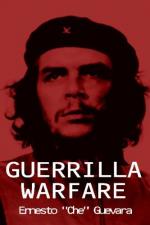
|
| Name: _________________________ | Period: ___________________ |
This test consists of 15 multiple choice questions and 5 short answer questions.
Multiple Choice Questions
1. Each squad and the members of each squad carry what with them?
(a) A change of clothes.
(b) All of their equipment.
(c) A weapon.
(d) A shield.
2. What is made up of no more than 12 men led by lieutenants?
(a) Brigades.
(b) Platoons.
(c) Columns.
(d) Squads.
3. Guevara writes that food and tobacco, as well as other supplies should be distributed so as to maintain the _____ of the squad.
(a) Cohesiveness.
(b) Ranking.
(c) Segregation.
(d) Alienation.
4. Guevara writes, "Naturally, it is not to be thought that all conditions for revolution are going to be created through the impulse given to them by" what?
(a) Guerrilla activity.
(b) The peasants.
(c) The government.
(d) The women.
5. What term refers to a mode or system of rule or government?
(a) Regiment.
(b) Regime.
(c) Vanguard.
(d) Oversystem.
6. The guerrilla must always act in the spirit of what, according to Guevara?
(a) Duty.
(b) Godliness.
(c) Adaptability.
(d) Respect.
7. Most guerrilla strikes must be made quickly so that the enemy does not have time to do what?
(a) Communicate.
(b) Retaliate.
(c) Rearm.
(d) Strategize.
8. What does Guevara claim is a kind or reformer who directly fights the agents of unjust institutions?
(a) The military leader.
(b) The president.
(c) The guerrilla fighter.
(d) The teacher.
9. Captured or wounded enemies should be treated how, unless they are dedicated counterrevolutionaries?
(a) With torture.
(b) With distance.
(c) Brutally.
(d) With respect.
10. Guevara advises that the guerrilla set up the capability to repair their own clothing and shoes as well as the ability to make their own what?
(a) Gunpowder.
(b) Bayonets.
(c) Knives.
(d) Tanks.
11. Guevara notes that in underdeveloped Latin America ______________ is the best place for fighting a revolution.
(a) The city.
(b) The suburbs.
(c) The countryside.
(d) The water.
12. Guevara writes, "The enemy soldier in a zone of operations ought not to be allowed to" what?
(a) Escape.
(b) Communicate.
(c) Sleep.
(d) Fire weapons.
13. Suburban guerrillas will never arise on their own but need to be cultivated and commanded by who?
(a) Guerrilla bands in the countryside.
(b) City officials.
(c) City governments.
(d) Peasant brigades.
14. What refers to the head commander of a guerrilla column and will have up to 150 men under his command as well as several captains and lieutenants under him?
(a) Lieutenant.
(b) Captain.
(c) Commandante.
(d) Officer.
15. A guerrilla army is organized into units of 100-150 men is called what?
(a) Squads.
(b) Troops.
(c) Columns.
(d) Brigades.
Short Answer Questions
1. What term refers to a settled or established opinion, belief or principle?
2. Che Guevara claims that as the war progresses the guerrilla must aid the poor and ____ the rich as much as possible.
3. The guerrilla must be careful to defend roads and other avenues of reinforcement so that his band will not be what?
4. What refers a region of the Americas where Romance languages -- particularly Spanish and Portuguese, and variably French - are primarily spoken?
5. What refers to a shoulder mounted rocket launcher, extremely effective as an anti-tank weapon?
|
This section contains 470 words (approx. 2 pages at 300 words per page) |

|




